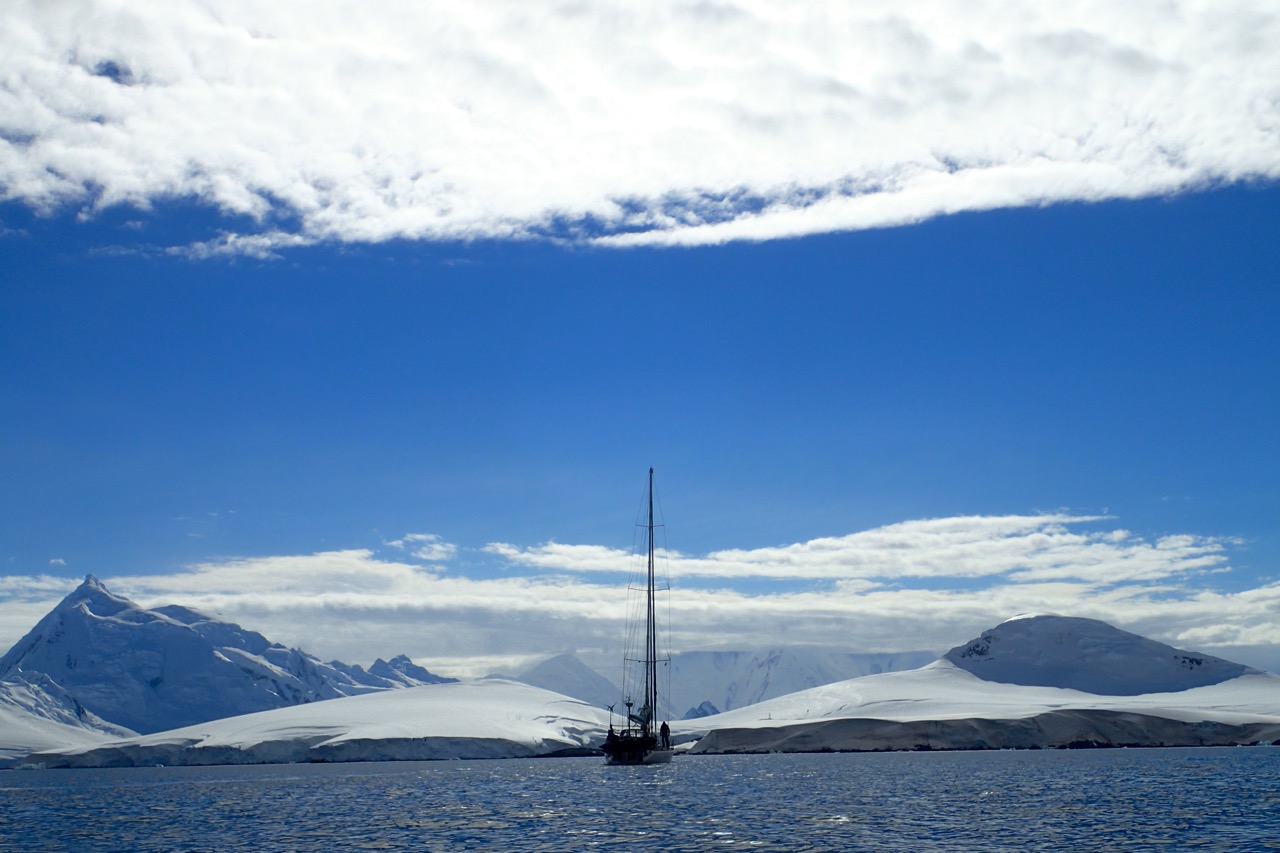 7/1/18 11:30pm
7/1/18 11:30pm
Watching the Chinstrap Penguins today was like watching a soap opera, but with far more deadly consequences. The chicks were one to three weeks old, fluffy and very cuddly looking. Returning penguins display and call to their mates and enter into noisy, mutual displays before handing over responsibilities for the two chicks. Nesting birds squabble with their neighbours – seemingly over pebbles for the nest, social space or just irritating behaviour. Sometimes the squabbles extended beyond squawking and vicious fights developed with pecking and wing flapping until the offender was driven from the colony.
Life is not easy for penguins. Returning from the sea after their 40km fishing trip the penguins porpoise in towards shore in schools to run the gauntlet past patrolling leopard seals. We watched as a seal caught and then shook a penguin out of its skin, all the better to gobble down the good bits. The seals may be slower but they have a big advantage as landing on shore is not easy. The penguins have to time their landing on the rocks to match the swells and then pop out and hopefully land upright on the rocks. From here it’s a steep climb up to the rookery and the penguins jump and waddle up the ramp in order to regurgitate their feed of krill for the youngsters. Walking is not their strong suit: it’s a matter of waddling, flapping and the occasional hop to beat an undignified file up the hill.
Just as bad as the leopard seals are the ever-vigilant skuas, a nasty larger form of gull with very little in the way of manners. They are always flying overhead like angels of death, on the lookout for unguarded eggs, defenceless babies or even just a weak adult on its own. If they come anywhere near the colony, the penguins join forces to flap and peck the intruder away, and the penguin can be vicious despite it’s cute reputation.
Observing the daily life of a penguin makes one think – what would a visitor think of the daily life of an Antarctic sailing tourist? Our group of nine is not exactly in its natural element (with a few exceptions), but we have been adapting well to the pressures of ‘boat life’. The main challenge is dealing with the extremely limited space and avoiding constantly stepping on each other’s toes.
A fundamental principle is that of “pass me the…” or “would you mind just doing the…”. There is so little room to move around in the cabin that if everyone were to grab whatever they needed or to do the small thing that needed to be done (the usual, and generally efficient, way of life at home), we would never get anything done. As a result, if you can see someone closer to the thing that you need or the small task that needs to be done, you must ask them without any shame to grab it/do it for you. Indeed, employing this rule is a virtue, not a sign of sloth.
A few other general points about ‘boat life’. Fresh water is extremely limited, consisting of only the supply we took on board in Ushuaia plus whatever we make ourselves (using the water desalting machine onboard). Despite what you might think a water desalting machine doesn’t mean unlimited water – it uses fuel (another rapidly expendable resource) and isn’t amazingly fast. The upshot is that we use salt water whenever we can: to cook the pasta, the clean the dishes, and to wash our gear. And for the rest, we use as little fresh water as we can. Taps are never left running into the drain for any decent period of time, fresh running showers are non-existent (we use bursts of water at a time to sud up and rinse down), and in general we try to drink as much of the stuff as we can.
Specific to our climate are a few features. The sun sets at about 11pm where we are and gets up again at 4am, and as a result we have vast quantities of daylight hours for activities. This means we have to be careful to maintain a semblance of routine to avoid becoming uncivilised – there are very few external cues to tell you to have lunch or to get ready for bed. Things are definitely getting easier now that we are at anchor and off the watch system (for now).
Another aspect of Antarctican life is the cold. Sometimes we are treated to a balmy day, equivalent to a dubious Wellington winter day with a bit of a gale, and sometimes it’s dark, freezing and wholly unfriendly. Particularly at night, the temperatures drop to single figures or below, and as a consequence we often sleep rugged up in sleeping bags with a few pieces of clothing on. Normal shoes wouldn’t cut it, so we wear Crocs or similar on board (insulated gumboots outside while sailing) and good tramping boots with multiple pairs of socks out on land.
Tomorrow we pick up the kayaks from the cruise ship that has transported them down for us, and we might manage to fit in a decadent hot pool – not on board, but on shore, in one of the geothermally heated tidal pools that are common here on Deception Island. It’s sometimes hard to remember that we are anchored in the crater of an active volcano sometimes, but two scientific bases were destroyed by eruptions in 1967 and 1969, and the bay we are rested in didn’t even exist before then!
Ross/Liam
